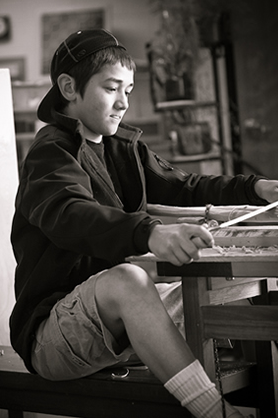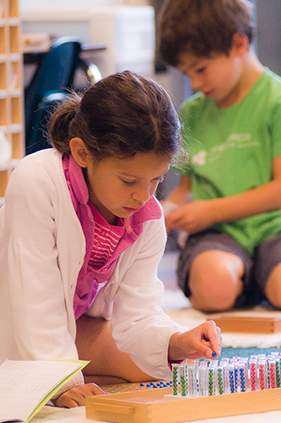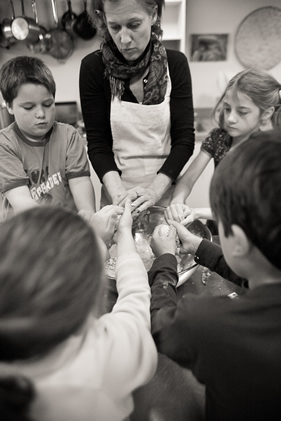


Learning How to Think
The Montessori Elementary program offers an unparalleled opportunity for the ongoing development of your child who has been nurtured in the Primary program. He is entering a new period in his life; this imaginative, social, creative child needs a planned environment and expansive course of study to support his burgeoning independence and potential. The Montessori Elementary program, for children between the ages of six and twelve, is designed to meet the needs of your child in this phase of development. This experience will shape not only his knowledge and skills but also his attitude about learning for the rest of his life. Montessori Elementary classrooms across the world share the following traits:
Montessori elementary is built on the foundations of the primary.
When your six-year-old comes into the elementary class from the Montessori primary, she will find much that is familiar in this new setting. The elementary classroom environment is beautiful and thoughtfully prepared to support independent learning; it is child-centered, not adult-centered. There is access to the outdoors and the kinds of learning that can only take place in nature. Many of the beautiful, inviting Montessori materials from the Primary classroom are also found in the elementary, where your child will use them in new ways suited to her expanding mind, and make her own discoveries in language, math, and science. Perhaps most importantly, the other children in the class have a similar background of being treated with respect and support and have developed into confident, competent students.
The elementary “curriculum” is only limited by a child’s imagination
The goal of a traditional curriculum is to delineate what a child is supposed to learn. At Montessori, we want your child to be able to learn everything! The starting point for all courses of study is the “Great Lessons”; these impressionistic and scientific stories are presented every year and give the students the “big picture” of cosmology, astronomy, earth science, geography, chemistry, physics, biology, history, anthropology, cultural and social studies, language, math, music, and art. Subsequent lessons offer the children keys to exploring these areas of human knowledge in more detail. As in the primary, the lessons are starting points for your child’s own activity. Meaningful learning happens when children are inspired by a lesson and begin to explore the subject and work on their own,
Children work collaboratively and cooperatively.
In the Primary classroom, your child was best able to concentrate when working parallel to his peers, each with her own activity. Elementary children, however, are at a different stage of development and have a strong drive to be social and to collaborate. For this reason, most of the lessons and follow-up projects in elementary are done in pairs or groups of children. Each day, your child will practice the social skills necessary to plan and carry out his projects: delegation and division of labor, sharing resources, making group decisions, taking responsibility for actions, and celebrating the success of peers. Conflict is not uncommon, but the motivation to resolve it comes from the children and their engagement with their projects. The Montessori teacher models and supports constructive and respectful problem-solving. Learning how to work well with the different personalities and characteristics of other children in the classroom community is a significant life lesson with practical applications in the “real world” of high school, college, and the professional workplace of the future.
The classroom is designed to nurture imagination and reason.
Elementary-age students are naturally curious and have a strong internal drive to discover how our world works. They may ask, “How does a fish breathe underwater?” “What number comes after a trillion?” “What causes a volcano to erupt?” Instead of simply giving them the correct answers, Montessori elementary teachers ask the right questions; they tell stories to inspire the children’s imagination and tantalize them to explore on their own to find out more: about volcanoes and dinosaurs and Monet and gladiators and poppies and skateboards and butter churning and cheetahs and – there is no limit! Driven by their passions, the children are open to input from the teacher that refines their reading, writing, reasoning, and research skills. Designing our elementary program around the children’s natural cognitive abilities means that our focus is less on the facts and concepts we teach and more on what the children learn and how they learn it.
The children’s work is open-ended and creative.
Each child’s response to a lesson is unique, and their follow-up work reflects those individual differences. Your child is free to form or join a group to work with the concepts introduced in a lesson. For example, a group of children might have a lesson on the parts of a river. Some might choose to label an outline map with the rivers of North America. Others might choose to repeat the demonstration with the river model (and without the teacher), labeling for themselves the parts previously demonstrated. Another pair might be intrigued by a particular river mentioned in the lesson or by the river running through their city, and they might launch a research project about the Mississippi or the Willamette. Because the children are free to move around the classroom and see what others are doing, it’s not uncommon for an idea to spread; children are stimulated not just by the teacher’s lessons, but by each other.
Children are agents in their own education.
Children in Montessori have significantly more input into how they are taught, and control over how they learn than children in traditional school settings. Their natural learning styles and preferences are respected and supported. The multi-age format of the classroom prevents the comparison of children; differences in ability and achievement are expected. Lessons are presented in small groups to the children who are ready for them, regardless of their age. There is no social disadvantage to being bright, interested, and motivated at school. Likewise, there is no stigma for reviewing or repeating lessons to gain mastery. Your child is free to continue to work with a material or concept as long as necessary, or to move on when he is ready for a new challenge. In Montessori, all children get straight “A’s” because they only move on when they really understand a concept.
The children explore their own interests while meeting age-appropriate standards.
Montessori elementary students study both broadly and deeply, covering many subjects not attempted in traditional schools. The children often develop expertise in a subject that is especially interesting to them. Because there is not a rigid schedule or prescribed curriculum that the whole class must follow, your child can focus intensely on her self-chosen work, with minimal interruption. At the same time, she will collaborate with the teacher to ensure that the basic skills for each grade are mastered. A version of the public school standards is available to the class, and the teacher facilitates your child’s use of these standards as a guide to her work choices. To support her individualized plan of study, the teacher meets with her regularly to plan and assess her progress.
The children are empowered to seek knowledge beyond the classroom.
An important component of the elementary program is what we call “Going Out.” Going Out occurs for a group of children when exploration of a topic exhausts the resources of the classroom. We want the children to be comfortable navigating the world, not just our classrooms. So, we have a few excellent books, but not everything there is to read about a topic. We have many evocative art and construction materials, but probably not the one perfect thing that a group of children needs to build their model. As a result, the children must “go out” beyond the limits of the classroom to find the information or resource that they need.
A Going Out is a planned undertaking by a small group of children. They find a resource in the community, schedule the outing, arrange for their own transportation and supervision (by staff or parent volunteers), prepare themselves for the experience, conduct themselves with dignity while out in public, and return to share their research with the rest of the class. Each Going Out is an entire course of study on independence, responsibility, and good citizenship —to say nothing of the intellectual rewards that children get from such experience. Montessori elementary children go out to the public library, museums, farms, local businesses, and public service institutions. They visit other schools and consult with experts. They attend plays, ballets, concerts, public lectures, tours, and other civic offerings. They spend time outside, having direct experiences with the natural world. Montessori children might go out occasionally or often, but the experiences are always deeply personal and memorable.
Montessori elementary children transition well into other schools
At the end of the Montessori elementary program, your 12-year-old is ready for a very important transition: becoming an adolescent. His elementary years have given him the freedom to develop as a unique individual. He has experienced the challenges and rewards of working with a group of other children of different ages and has seen his skills and talents put to use in many group projects. He has developed proficiency in all areas of academic endeavors and looks forward to new opportunities beyond Montessori elementary. He loves and trusts the adults with whom he works. Above all, he is flexible and adaptable.
These skills, the culmination of the six-year Montessori elementary program, will help him to easily assimilate into new academic and social situations in high school, college, and beyond.
Your child is now ready to move on to the Montessori Adolescent Program